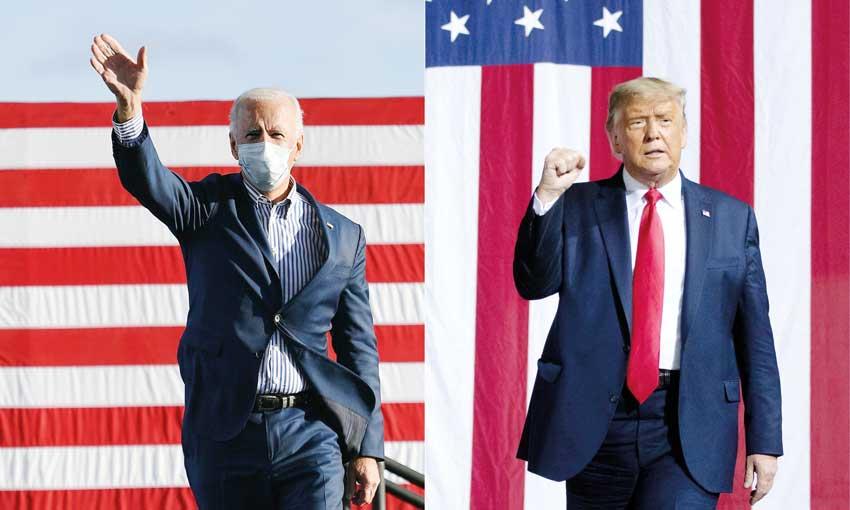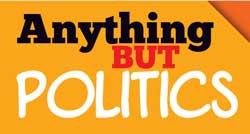Reply To:
Name - Reply Comment

This combination of picture shows Democratic presidential nominee Joe Biden (left) and US President Donald Trump waving at supporters at rallies in the run-up to the US Presidential Elections (AFP)
In the US people don’t appear to have despised President Trump as such for not taking the pandemic with due seriousness
President Trump’s Republican Party and Biden’s Democratic Party clinched victories in the States traditionally considered their strongholds
As far as Sri Lanka’s relations with the US is concerned, two aspects reigned in most—the US Indo-Pacific strategy and the UNHRC process
GoSL will be happy to see the US not persisting with UNHRC related matters
 Presidential Elections in the United States (US) generate interest from the world over. Americans went to polls on November 3 in record numbers, according to the foreign media, braving the pandemic.
Presidential Elections in the United States (US) generate interest from the world over. Americans went to polls on November 3 in record numbers, according to the foreign media, braving the pandemic.
The results had started rolling in yesterday. This was an election meant for American citizens to re-elect incumbent President Donald Trump or to unseat him in favour of onetime Vice President Joe Biden, the candidate fielded by the Democrats.

In the run-up to the elections, most opinion polls predicted President Trump would lose the election this time over criticism of his response to the COVID-19 pandemic that took a heavy toll on US citizens and the economy. In the pre-COVID-19 context, the sitting President had major pluses up his sleeve for re-election. The sound performance of the US economy and his policy on immigration stood in his favour among conservatives. However, the pandemic broke out making the US the worst affected country in the world, with nearly ten million cases and 233,000 fatalities. The president’s response to the pandemic came under severe criticism by the US mainstream media, and some analysts projected all his gains would be undone by his handling of the health crisis. They forecast his ranking against rival Joe Bidden would drop drastically.
The election took place against such a backdrop. A record number of people lined up for voting, and over 100 million people had cast their ballots either by mail or through early voting, making it a record. The fear of the coronavirus spurred early voting.
But, this election appeared to be extremely unpredictable as results of the States that rolled out first as of yesterday found both candidates neck and neck. The results clearly indicated President Trump’s popularity had not plummeted to abysmal depths over his handling of the pandemic, contrary to perceptions held by many in this regard.
COVID-19 is a viral disease without a medicinal cure. Globally, it has been contained only by the restriction of people’s movements. In the countries that succeeded in the “test trace and isolate” method, the spread was controlled. It has spread far beyond and spun out of control in the countries or regions where restrictive measures were adopted less and less. The tighter the control on public movements, the more the disease spread is controlled. In some countries such as Sri Lanka, people, in relative terms, are more tolerant of restrictive measures as a means of controlling the spread and protecting lives. This is not exactly the same in the western part of the world where people tend to value individual freedom more and more in the midst of the pandemic. Most countries are experiencing a second outbreak of the disease, but it is hard to sell lockdowns once again. So to speak, in the US people don’t appear to have despised President Trump as such for not taking the pandemic with due seriousness. Otherwise, at least a close fight could not have been expected as per the results that trickled down yesterday.
In the US presidential elections, the winner is determined not by the direct vote of people. The winner is selected by the Electoral College, a body of 538 representatives covering all 50 States in the country. The number for each State is determined in terms of population size. The more populous states get more representation in the Electoral College. The winner was not yet clear as of yesterday, though President Trump had declared the result prematurely.
President Trump’s Republican Party and Biden’s Democratic Party clinched victories in the States traditionally considered their strongholds. As a result the final battle had narrowed down to a few States where the results were coming in.
As far as Sri Lanka’s relations with the US is concerned, two aspects reigned in most—the US Indo-Pacific strategy and the UNHRC process. During the last four years under President Trump, the US pulled out from the UNHRC and even called it a cesspool of political bias. Before that, the US under Democratic Party rule, took an active role in it, and was the key player in moving resolution after resolution against Sri Lanka at the UNHRC calling for a probe into alleged rights violations and accountability issues during the last stages of the war. This pressure lessened after the US moved out of the process under the Trump administration. Of course, references were made in regards to the need for addressing these issues in remarks and statements, but real pressure did not emanate since the focus of interest was different.
The Government of Sri Lanka (GoSL) under President Gotabaya Rajapaksa will be happy to see the US not persisting with UNHRC related matters in its engagements with Sri Lanka. In fact, the Government has sought to withdraw from co-sponsorship of the UNHRC resolution 30/1 adopted in 2015. The possible re-election of President Trump would make matters easier for the current Sri Lankan administration as far as its engagement with the international community is concerned regarding war-time issues. If Biden wins, the US will rejoin the UNHRC, and it won’t be good news for the new GoSL.
However, the US-China spat has begun to play out openly in Sri Lanka and in the region. The Trump administration was vigorously pursuing the Indo-Pacific strategy. Secretary of State Mike Pompeo wrapped a visit to the region, and he landed in Sri Lanka last week. It appeared that he came with a clear message; that is to prevent Sri Lanka being drawn into the ambit of Beijing. President Rajapaksa made it categorical that Sri Lanka’s foreign policy was neutral and non-aligned.
The US-China feud will play out further under the Trump administration, making it challenging for Sri Lanka to realise its neutral, non-aligned policy in the real sense of the word. It will be an area then for Sri Lanka to walk on a tight diplomatic rope.